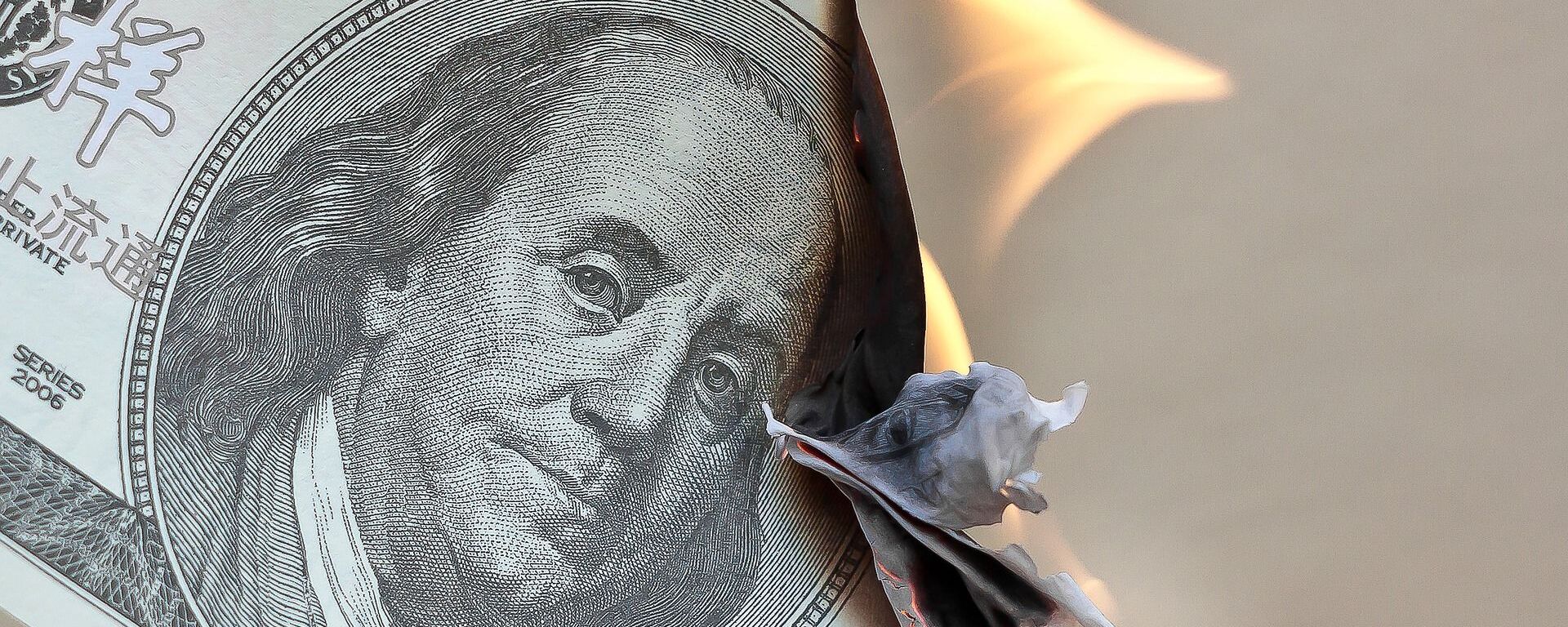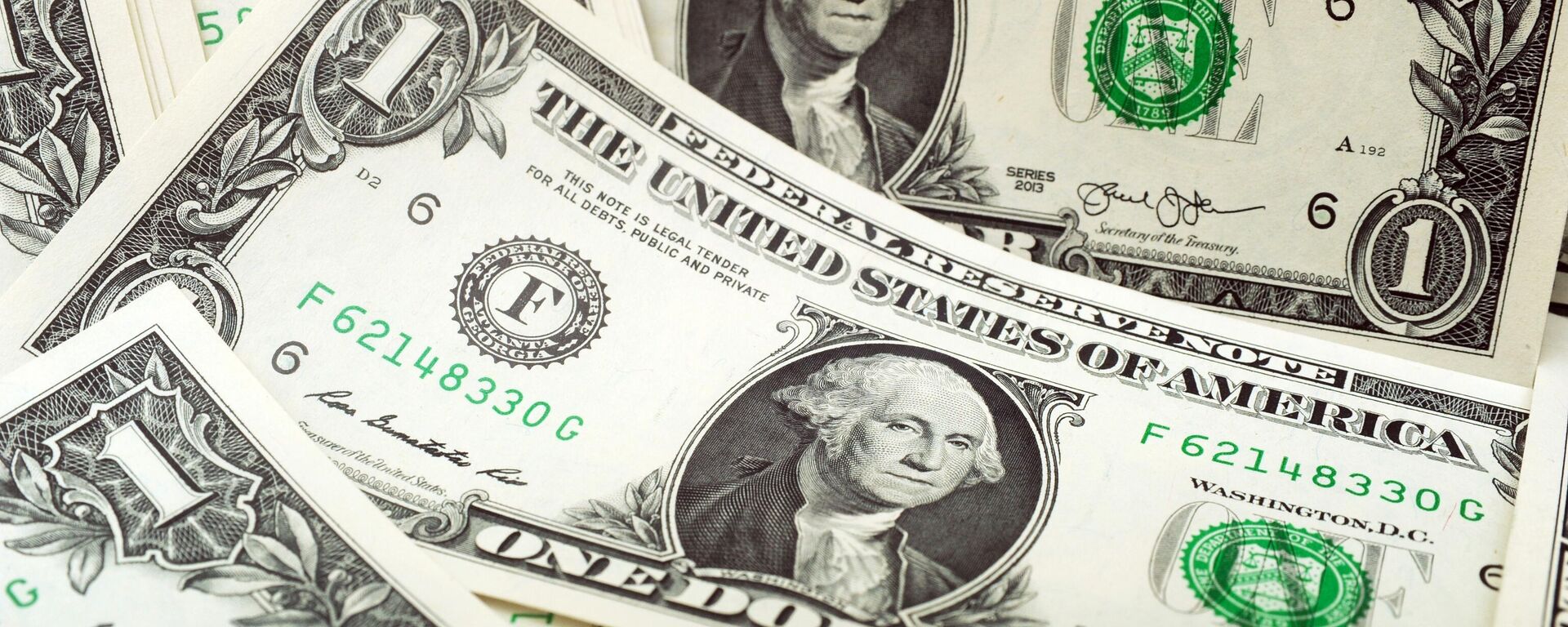https://sputnikglobe.com/20240701/downhill-since-bretton-woods-unipolar-us-dollar-mutated-into-politically-weaponized-tool-1119202058.html
Downhill Since Bretton Woods: ‘Unipolar US Dollar' Mutated Into 'Politically Weaponized' Tool
Downhill Since Bretton Woods: ‘Unipolar US Dollar' Mutated Into 'Politically Weaponized' Tool
Sputnik International
US dollar has degenerated into a “unipolar and unreliable, politically weaponized” tool, Paul Goncharoff, chief manager of consulting firm Goncharoff LLC, told Sputnik.
2024-07-01T10:26+0000
2024-07-01T10:26+0000
2024-07-01T13:47+0000
dedollarisation
analysis
bretton woods
brics
international monetary fund
us
dollar
ditching dollar
dollar trade
dollar hegemony
https://cdn1.img.sputnikglobe.com/img/107034/47/1070344747_0:61:1920:1141_1920x0_80_0_0_8d80c7508ffaf16fcba55f9920d5ee1c.jpg
Since the US dollar was made the “de facto steward of the global economic system” by the Bretton Woods Agreement it has abused that role, Paul Goncharoff, chief manager of consulting firm Goncharoff LLC, told Sputnik. The greenback has degenerated into a “unipolar and unreliable, politically weaponized” tool, he noted.The creation of BRICS has motivated many countries to embark on an organized effort to dedollarize and break free from the vicious political cycle, as pointed out by the experienced financial analyst.The US dollar was officially crowned the world’s reserve currency, backed by the world’s largest gold reserves, when the international monetary system known as the Bretton Woods system was forged at the eponymous American resort in New Hampshire in July 1944. At the time, delegates to the United Nations Monetary and Financial Conference agreed to establish the International Monetary Fund (IMF) and what became the World Bank Group to regulate mutual settlements and currency relations. The system lasted until 1971.“The Bretton Woods system agreed to at the end of WW2 set out the rules to govern monetary and commercial relations among the United States (the leader), and what is generally understood to be the "West" consisting then of 44 countries. The Bretton Woods system mandated the convertibility of their currencies into U.S. dollars to within 1% of a fixed rate, with the dollar convertible to gold bullion for foreign governments and central banks at the established rate of US$35 per troy ounce of gold. This also was where the International Monetary Fund (IMF) was created to monitor exchange rates and lend reserve currencies to nations with balance of payments deficits,” Goncharoff clarified.In effect, the system had all of the worlds’ currencies pegged to the dollar, and the dollar pegged to gold. The fixed exchange rate system required non-reserve countries to give up the independence of their own monetary policy, regardless of the need for adjustments in response to changing domestic economic circumstances.By the 1960s, the dollar was grossly overvalued, as the US did not have enough gold to cover the volume of greenbacks in worldwide circulation due to the "constant and growing US balance-of-payments deficits," Goncharoff pointed out. That implied that the United States could not fulfill its obligation to redeem dollars for gold at the officially set price, “much like the significant current balance of payments deficit and debt profile the US is showing today although wholly unlinked to gold as the key marker,” he added.When then-President Richard M. Nixon rolled out his New Economic Policy in 1971, it signaled the demise of the Bretton Woods system of fixed exchange rates. By 1973, all currencies were permitted to float freely.“The broad agreements called the Jamaica Accords were understandings that ratified the end of the Bretton Woods monetary system. They took the form of recommendations to change the 'articles of agreement' that the International Monetary Fund (IMF) was founded on. These accords allowed the price of gold to float vs. the US dollar and other currencies within agreed parameters. These parameters often went outside of the agreed valuation corridor, similar to trying to force a Genie of value to remain bottled. It is sufficient to look at what the current price of gold is in USD terms internationally to appreciate the blowback against the restrictive USD,” Goncharoff remarked.Both global and national economies are continuing to face challenges as they try to overcome the consequences of the inherent flaws in the Bretton Woods system, the financial expert noted.Furthermore, analysts at the Russia's Pivot to Asia website wrote that two “main global financial evolutionary events” are unfolding right now. These involve changes to the role of the US dollar, and “technology and the digitization of financial transactions.”America has itself to blame for the loss of the greenback’s credibility as a global currency, mainly due to the mind-boggling US-dollar issued debt - a whopping $32.72 trillion.He forecasts that the US dollar “will become prone to increasing shocks, leading to uncertainty and mistrust on the global financial markets.” If the US were to default on its debt, American bondholders would carry losses on their investments, and the negative impacts on global trade would be huge, he warned. He underscored that the US treasury norm of printing of more dollars to cover up the fiscal debt “debases the actual value of the currency and encourages inflation.”While Moscow has effectively “inoculated” itself from looming future problems with the US economy, other countries, like China, are doing the same. The trade focus is shifting away from the United States, fueling a geopolitical evolution of trade blocs like BRICS, the Eurasian Economic Union and Shanghai Cooperation Organization, with some like BRICS discussing alternative currency platforms.“One proposal for a unified BRICS trade unit is the "BRICS Bridge" allowing the ten current members to exchange units based 60% of their sovereign currencies and 40% backed by their gold reserves,” noted Goncharoff, and summed up:.Furthermore, the US has used the dollar as a trade and geopolitical weapon, said the pundit, seeking to abuse economies of Venezuela, Iran, Turkey and Russia amongst others.“It has done this in two main areas, firstly by manipulating the US dollar currency exchange rates in order to damage other national currencies when the US wants to inflict fiscal punishments or seek trade advantages,” remarked the analyst, adding that Washington "has also used the global SWIFT payment network as a switch to turn US dollar trade on and off according to its policies."“Other governments are becoming concerned that these punishments could in future be meted out to them, which also creates mistrust and fear of US dollar over-exposure. Any one of these problems are serious. It appears ultimately unlikely the United States will be able to fend off the repercussions of them all. In short - the United States has massively over-extended itself and damaged its own reliability as a global trade partner,”
https://sputnikglobe.com/20240513/de-dollarization-bombshell-the-coming-of-brics-decentralized-monetary-ecosystem-1118409748.html
https://sputnikglobe.com/20240626/dedollarization-now-underway-because-of-us-policies-says-senate-hopeful-1119141516.html
https://sputnikglobe.com/20240509/brics-blocs-bullion-buy-up-buoys-trend-toward-dedollarization-1118365980.html
Sputnik International
feedback@sputniknews.com
+74956456601
MIA „Rossiya Segodnya“
2024
News
en_EN
Sputnik International
feedback@sputniknews.com
+74956456601
MIA „Rossiya Segodnya“
Sputnik International
feedback@sputniknews.com
+74956456601
MIA „Rossiya Segodnya“
de-dollarization, dollar hegemony, gollar as a sanctions tool, us dollar politically weaponized, decentralized monetary system, brics, calls to scrap the us dollar, brics' drive to abandon the dollar for national transactions, un members' push for dedollarization, bretton woods conference, bretton woods system
de-dollarization, dollar hegemony, gollar as a sanctions tool, us dollar politically weaponized, decentralized monetary system, brics, calls to scrap the us dollar, brics' drive to abandon the dollar for national transactions, un members' push for dedollarization, bretton woods conference, bretton woods system
Downhill Since Bretton Woods: ‘Unipolar US Dollar' Mutated Into 'Politically Weaponized' Tool
10:26 GMT 01.07.2024 (Updated: 13:47 GMT 01.07.2024) A US-dominated monetary framework was put into place 80 years ago in Bretton Woods. It bred everything ranging from chronic deficits and speculative bubbles to politically-motivated sanctions, while allowing the greenback to reign supreme. Since the system’s collapse, global economies have been dealing with the blowback of its inherent failings.
Since the US dollar was made the “
de facto steward of the global economic system” by the Bretton Woods Agreement it has abused that role,
Paul Goncharoff, chief manager of consulting firm Goncharoff LLC,
told Sputnik.
The greenback has degenerated into a “
unipolar and unreliable, politically weaponized” tool, he noted.
The
creation of BRICS has motivated many countries to embark on an organized effort to dedollarize and break free from the vicious political cycle, as pointed out by the experienced financial analyst.
“The "extraordinary privilege" enjoyed by the USD as the lead global reserve currency has over time tested the discipline, resolve, and trust of the United States government… It was found wanting, as what should have been economically sound objective decisions steadily degenerated into politically "weaponized" short-term actions that were hugely expensive for the rest of the world,” he said.
The US dollar was officially crowned the world’s reserve currency, backed by the world’s largest gold reserves, when the international monetary system known as the Bretton Woods system was forged at the eponymous American resort in New Hampshire in July 1944. At the time, delegates to the United Nations Monetary and Financial Conference agreed to establish the International Monetary Fund (IMF) and what became the World Bank Group to regulate mutual settlements and currency relations. The system lasted until 1971.
“The Bretton Woods system agreed to at the end of WW2 set out the rules to govern monetary and commercial relations among the United States (the leader), and what is generally understood to be the "West" consisting then of 44 countries. The Bretton Woods system mandated the convertibility of their currencies into U.S. dollars to within 1% of a fixed rate, with the dollar convertible to gold bullion for foreign governments and central banks at the established rate of US$35 per troy ounce of gold. This also was where the International Monetary Fund (IMF) was created to monitor exchange rates and lend reserve currencies to nations with balance of payments deficits,” Goncharoff clarified.
In effect, the system had all of the worlds’ currencies pegged to the dollar, and the dollar pegged to gold. The fixed exchange rate system required non-reserve countries to give up the independence of their own monetary policy, regardless of the need for adjustments in response to changing domestic economic circumstances.
By the 1960s, the dollar was grossly overvalued, as the US did not have enough gold to cover the volume of greenbacks in worldwide circulation due to the "constant and growing US balance-of-payments deficits," Goncharoff pointed out. That implied that the United States could not fulfill its obligation to redeem dollars for gold at the officially set price, “much like the significant current balance of payments deficit and debt profile the US is showing today although wholly unlinked to gold as the key marker,” he added.
“The era of Quantitative Easing (QE) over the past two decades is clearly illustrative of the lack of an anchor in US monetary policy, which sadly every non-USD country who wish to remain aligned with it must pay for... exorbitantly,” said the pundit.
When then-President Richard M. Nixon rolled out his New Economic Policy in 1971, it signaled the demise of the Bretton Woods system of fixed exchange rates. By 1973, all currencies were permitted to float freely.
“The broad agreements called the Jamaica Accords were understandings that ratified the end of the Bretton Woods monetary system. They took the form of recommendations to change the 'articles of agreement' that the International Monetary Fund (IMF) was founded on. These accords allowed the price of gold to float vs. the US dollar and other currencies within agreed parameters. These parameters often went outside of the agreed valuation corridor, similar to trying to force a Genie of value to remain bottled. It is sufficient to look at what the current price of gold is in USD terms internationally to appreciate the blowback against the restrictive USD,” Goncharoff remarked.
Both global and national economies are continuing to face challenges as they try to overcome the consequences of the inherent flaws in the Bretton Woods system, the financial expert noted.
“In essence, the more the United States prints and spends USD, the more the rest of the world is expected to invest in US government paper, and subsidize this debt-spending. The BRICS nations and their adherents are advocating for the use of national currencies for cross-border trade, eventually de-linking from the increasingly unipolar and visibly unreliable US Dollar,” Goncharoff explained.
Furthermore, analysts at the
Russia's Pivot to Asia website wrote that two “
main global financial evolutionary events” are unfolding right now. These involve changes to the role of the US dollar, and “
technology and the digitization of financial transactions.”
America has itself to blame for the loss of the greenback’s credibility as a global currency, mainly due to the mind-boggling
US-dollar issued debt - a whopping
$32.72 trillion.
“It has created a scenario where foreign governments are increasingly wary of investing in additional US dollar debt until a management system is put in place that will be able to support such a load,” Goncharoff noted.
He forecasts that the US dollar “will become prone to increasing shocks, leading to uncertainty and mistrust on the global financial markets.” If the US were to default on its debt, American bondholders would carry losses on their investments, and the negative impacts on global trade would be huge, he warned. He underscored that the US treasury norm of printing of more dollars to cover up the fiscal debt “debases the actual value of the currency and encourages inflation.”
While Moscow has effectively “
inoculated” itself from looming future problems with the US economy, other countries,
like China, are doing the same. The trade focus is shifting away from the United States, fueling a geopolitical evolution of trade blocs like
BRICS, the
Eurasian Economic Union and
Shanghai Cooperation Organization, with some like BRICS discussing alternative currency platforms.
“One proposal for a unified BRICS trade unit is the "BRICS Bridge" allowing the ten current members to exchange units based 60% of their sovereign currencies and 40% backed by their gold reserves,” noted Goncharoff, and summed up:.
"For Russia, and most other nations, there is a far bigger picture - where non-US dominated, global trade opportunities beckon."
Furthermore, the US has used the dollar as
a trade and geopolitical weapon, said the pundit, seeking to abuse economies of Venezuela, Iran, Turkey and Russia amongst others.
“It has done this in two main areas, firstly by manipulating the US dollar currency exchange rates in order to damage other national currencies when the US wants to inflict fiscal punishments or seek trade advantages,” remarked the analyst, adding that Washington "has also used the global SWIFT payment network as a switch to turn US dollar trade on and off according to its policies."
“Other governments are becoming concerned that these punishments could in future be meted out to them, which also creates mistrust and fear of US dollar over-exposure. Any one of these problems are serious. It appears ultimately unlikely the United States will be able to fend off the repercussions of them all. In short - the United States has massively over-extended itself and damaged its own reliability as a global trade partner,”





